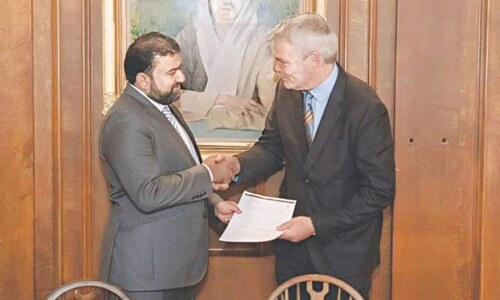WASHINGTON, Nov 2: Al Qaeda and Taliban militants used a 2006 peace agreement to regroup and carry out terrorist attacks in both Pakistan and Afghanistan, says Gen Ehsan ul-Haq, former chairman of the Joint Chiefs of Staff Committee.
“The implementation [of the agreement] needed to be better monitored,” Gen Ehsan told editors and reporters at The Washington Times.
“Very early, the violations should have been taken notice of [so that the extremists understood] that even the smallest violations would not be tolerated.” Pakistan had signed the peace agreement with tribal elders in North Waziristan to win cooperation of Pashtun tribes in halting cross-border attacks on NATO troops and the Afghan army.
Initially, the Bush administration was reluctant to endorse the agreement, fearing that it would allow the militants to regroup and re-emerge. But during a visit to Washington in 2006, President Pervez Musharraf persuaded President George W. Bush to approve the move.
Gen Ehsan said that poor implementation of the peace deal forced Pakistan to deploy nearly 100,000 troops to battle pro-Taliban militants in the region.
He blamed foreign fighters and Taliban sympathisers for using the truce not only to attack Afghanistan, but also to impose Taliban-style tactics in Pakistan, such as beheading people accused of being agents of the army or the Americans.
In time it became clear that the strategy had to be changed, he said, “but we still didn’t want the onus of breaking the agreement to come on us.
So the day [tribal leaders] said the agreement was broken, the army went in.” The agreement collapsed in early July when Pakistani commandos stormed the Red Mosque in Islamabad. Tribal leaders responded by scrapping the agreement. Since then, more than 700 civilians and soldiers have been killed in suicide attacks, roadside bombings and rocket attacks, while a full-blown insurgency has erupted in parts of the NWFP.
Although US officials and the media have long blamed the agreement for troubles along the Pak-Afghan border, this is the first time that a senior Pakistani official, even though retired, has admitted that the truce went wrong.
Prior to his retirement last month, Gen Ehsan oversaw three major military offensives in the northwest tribal areas of North and South Waziristan.
Gen Ehsan said the army had no choice in sending troops into the northwest. “We do consider extremism and terrorism to be the highest-priority threat to the security and well-being of Pakistan,” he said.
He rejected claims by critics that Pakistan is simply responding to pressure from the United States by cracking down on pro-Taliban militants. “We are looking at it primarily as to what is in the best interests of Pakistan,” he said. It is critical for Pakistan to “get hold of its internal security environment”.








































Dear visitor, the comments section is undergoing an overhaul and will return soon.